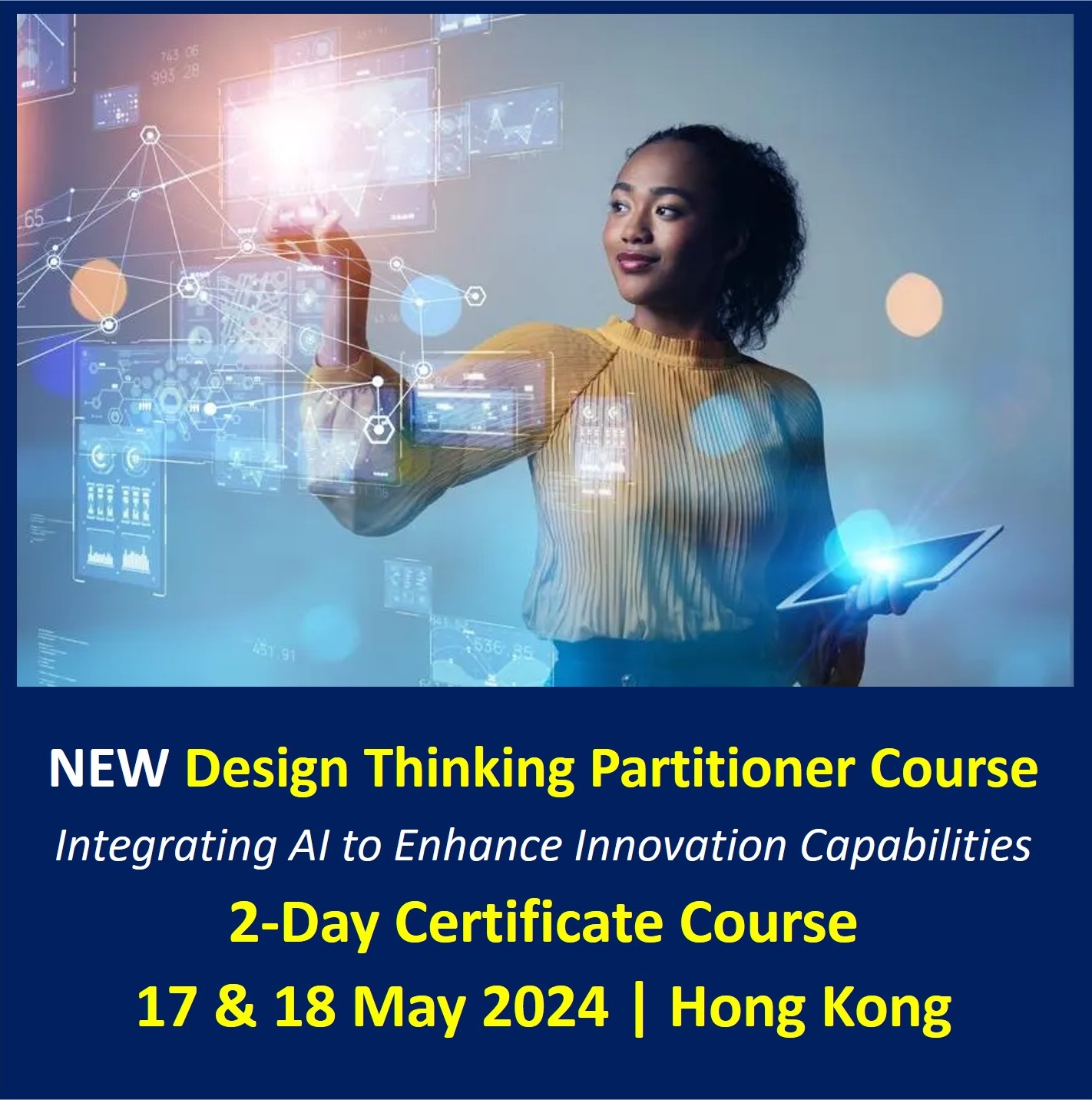English | 繁體中文


Aims | Target Audience | Objectives | Date, Fee & Registration | Details | Previous Classes
Part 1: Course Version and Aims
This is the 2024 edition of the course, now enhanced with content on Artificial Intelligence. Upon completion of the course, you will be fully prepared to apply Design Thinking principles and techniques, integrated with AI insights, in your professional endeavors.
The Aim is to help business professionals accelerate product enhancement, service improvement, and business model innovation by integrating Artificial Intelligence into Human-Centered business innovation processes.
This interactive course will equip you with the Design Thinking mindset, tools, and skills to kick-start bold innovation. It will also introduce how to leverage Artificial Intelligence to refine and implement these innovations. You will embark on a highly interactive learning journey, engaging in group work on a challenge under the guidance of skilled facilitators, with a focus on AI-enhanced Design Thinking processes.
This course is meticulously designed to specifically accommodate business leaders who are “EVEN unfamiliar” with Design Thinking and the use of AI tools such as Chat GPT, DALL-E, and Stormz.
Part 2: Target Audience:
- Innovation Teams: Team leaders responsible for leading corporate transformation or business improvement initiatives.
- Business Managers and Owners: Suited for professionals seeking to innovate their products or services.
- Business Professionals: Designed for individuals eager to expand their creative problem-solving capabilities.
- Business leaders: Perfect for leaders looking to enhance corporate innovation effectiveness or cultivate a culture of innovation.
Your Major Take-Away:
In today’s highly competitive world, having innovative designs for new initiatives is not enough. You must transform your innovative designs into new products or services to generate revenue. Thus, AI methods combined with Design Thinking tools and techniques will play a crucial role. In the two-day course, participants will experience four main stages, from “AI-based Market Demand Analysis” to “Implementation of AI-driven Solutions,” including Discovering users’ unmet, hidden, and potential needs; Defining high-return business opportunities; Developing all-rounded innovative ideas, and Delivering quantifiable business innovation results.

Part 3: Four Major Learning Objectives
Upon completion of the new program, you will be able to
(1) Master Traditional Design Thinking Principles and the Double Diamond Model: Establish a solid foundation in traditional design thinking principles. Learn about the guiding principles, core values, and the four-step implementation model known as the double diamond model. The model helps identify user needs effectively and serves as the basis for more advanced integrations with technology.
(2) Master the Optimal Integration of Design Thinking Methods and Artificial Intelligence Techniques: Discover how to overcome the limitations of previous design thinking skills with AI and complement your strengths to move projects forward faster and more efficiently.
(3) Conduct Quantitative Deep Analysis of User Emotions: Combine profound human empathy to understand user pain points and expectations fully. Supplement this with comprehensive analytical methods provided by artificial intelligence to uncover both overt and latent user needs accurately. This approach guides the design of innovative products or services that truly meet user demands.
(4) Enhance Design Thinking with AI to Boost Innovation: Utilizing three AI tools (such as Chat GPT, DALL-E, and Stormz) within eight design thinking techniques and tools to enhance practical application and efficiency in innovation. Specific applications include:
- Using ‘more comprehensive stakeholder relationship analysis’ to create a Stakeholder Map: AI tools can analyze and identify key stakeholders, providing data-driven insights to more accurately understand their needs and expectations, thereby facilitating more effective stakeholder management and communication strategies.
- Conducting Design Research with ‘deeper research question design’: AI tools help deepen the design of research questions, making research more targeted and efficient. AI can analyze massive amounts of user data, revealing subtle user behaviors and trends and helping teams uncover deeper insights.
- Designing a Persona Map with ‘more personalized simulation methods’: AI tools can help create more refined and personalized user personas, providing a comprehensive portrayal based on user behavior data and psychological analysis, making design solutions more aligned with actual users.
- Building a Customer Journey Map with ‘more meticulous methods’: AI’s capability to analyze data can track customer interactions in detail, creating more accurate and detailed customer journey maps. This helps identify key touchpoints and potential pain points, further optimizing user experience.
- Formulating a Problem Statement with ‘multi-angle analysis methods’: AI tools can synthesize information from multiple data sources, providing a multidimensional perspective on issues. This helps teams define and understand core problems more comprehensively, thereby more effectively guiding the development of innovative solutions.
- Executing Ideation Processes with ‘faster and broader methods’: AI can accelerate idea generation processes and make brainstorming more diverse, and enrich ideation.
- Prioritizing ideas with ‘more accurate ROI calculation methods’ in an Idea Prioritization Map: AI tools can analyze the potential value and implementation difficulty of each idea, helping teams scientifically arrange the priority of idea execution to ensure that resources are invested for maximum benefit.
- Creating a Service Scenario Map with ‘higher fidelity simulation methods’: AI tools can simulate realistic service scenarios, providing dynamic visualizations and interactive experiences. This allows teams to foresee and evaluate potential issues and outcomes of service implementation in the early stages, thereby making adjustments and optimizing service design proactively.
(5) Explore how to achieve the optimal balance between AI efficiency and human empathy in design thinking. Leveraging AI for data-driven insights and automation while ensuring that human-centric methods guide the understanding of user emotions and needs, this approach allows for the rapid iteration and refinement of ideas while maintaining a deep connection to the user’s emotional and cultural contexts.
Learning approach: Learning by Doing (Lecturing: 20% | Case study: 20% | Practices: 50% | Reflection: 10% )
Part 4: Date, Fee and Registration:
Hong Kong Classes:
22nd Cohort: “2-Day with 2-Follow-Up Session” Format: 17 & 18 May + 2 One-hour Online Team Follow-Up (will be scheduled on Friday evening)
23th Cohort: “2-Day” Format: 19 & 20 Jul
24th Cohort: “4 Half-day” Format: 5, 12, 19 & 26 Sep
Mainland China Classes:
Guangzhou: 26 & 27 Jul | Shanghai: 24 & 25 May
Time: 7.5 hours per day (9:30 am to 1:00 pm and 2:00 pm to 6:00 pm)
Language: Cantonese Presentation with English Materials
Mode: Face-to-Face Training Mode
Tuition Fee:
For HK Classes: HKD 6,500 (Early Bird | 1-month before the first lesson) | HKD 7,000 (Standard Price)
For Mainland China Classes: RMB 6,500 (Early Bird | 1-month before the first lesson) | RMB 7,000 (Standard Price)


Part 5: Course Details
**Download the Course Pamphlet**
Part 6: Previous Classes
The previous 21 public classes of the DTA Design Thinking Fundamentals course are listed below:
2023 (19th to 21th Cohort): 21 Oct | 22 Jul | 14 Apr
2022 (15th to 18th Cohort): 20 Oct | 7 Jul | 26 Apr | 17 Mar
2021 (10th to 14th Cohort): 2 Dec | 12 Oct | 19 Aug | 11 Mar | 16 Jan
2020 (5th to 9th Cohort): 19 Nov | 19 Aug | 3 Jul | 13 May | 16 Jan
2019 (1st to 4th Cohort): 2 Nov | 28 Sep | 26 Sep | 15 Aug
** The pdf version of Design Thinking Training and Design Sprint Service Catalogue 2024 **
English | 繁體中文









![[Class Recap] Empowering Your Creativity and Innovation Power](https://i0.wp.com/www.innoedge.com.hk/wp-content/uploads/2024/04/20240329_180728-scaled.jpg?resize=218%2C150&ssl=1)
![[Class Recap] Developing Sustainable Business Models through Systems Thinking](https://i0.wp.com/www.innoedge.com.hk/wp-content/uploads/2024/04/20240328_181754-scaled.jpg?resize=218%2C150&ssl=1)
![[Class Recap] Creating Wonderful User Experience through Customer Journey Design](https://i0.wp.com/www.innoedge.com.hk/wp-content/uploads/2024/04/20240328_131024-scaled.jpg?resize=218%2C150&ssl=1)





































